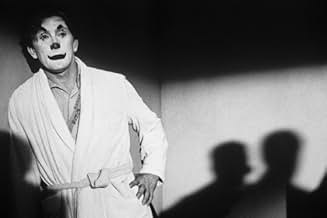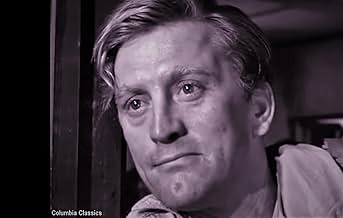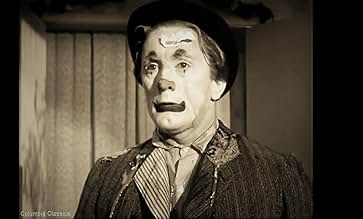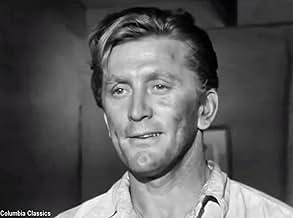En 1949, Hans Muller, antiguo preso de un campo de concentración y natural de Berlín, emigra a Israel, donde, debido a problemas psicológicos, no consigue adaptarse a la vida en tiempos de p... Leer todoEn 1949, Hans Muller, antiguo preso de un campo de concentración y natural de Berlín, emigra a Israel, donde, debido a problemas psicológicos, no consigue adaptarse a la vida en tiempos de paz.En 1949, Hans Muller, antiguo preso de un campo de concentración y natural de Berlín, emigra a Israel, donde, debido a problemas psicológicos, no consigue adaptarse a la vida en tiempos de paz.
- Premios
- 1 premio ganado en total
- Yehoshua Bresler
- (as Joey Walsh)
- Willy Schmidt
- (as Oscar Karlweis)
- Mukhtar
- (escenas eliminadas)
- Hannah
- (sin créditos)
- Refugee
- (sin créditos)
- Papa Sander - Susy's Father
- (sin créditos)
- Bus Driver
- (sin créditos)
- Telephone Girl
- (sin créditos)
- Audience Member
- (sin créditos)
- Mordecai
- (sin créditos)
Opiniones destacadas
Back in the day Douglas was a music hall entertainer, a juggler by trade, and from what I could see Douglas mastered the art himself to make his performance quite believable. As an actor I have never seen anyone better than Kirk Douglas to go from 0 to 120 in emotions in a matter of seconds. Kirk needed that ability to play the psychologically tattered Hans Muller.
A lot of folks who survived questioned the very nature of nature's God to have allowed such a thing to happen. Even more so they questioned the randomness of those who did survive. Douglas lost his wife and children there.
When he wanders away from the settlement camp in Haifa and is questioned by an Israeli policeman, the demons from Europe return and Douglas strikes at the cop. Thinking he's killed him Kirk goes on the run and he teams up with another camp survivor, an orphan played by Joey Walsh.
Their wanderings and eventually settling down in a kibbutz is most of the film. The Juggler was the first American production to be shot in Israel and we see Douglas and Walsh in the real Haifa, the real Nazareth and in the countryside of Israel which had seen its own war for survival at birth the year before.
The Juggler however does stick to the story and it doesn't just become an Israel travelogue. And it's a nice story about a good man who's seen the worst of what his fellow human beings can do just trying to find a place in a promising, but strange new world.
"Surviving the horror" could be another title for "the juggler" .A Jew ,who has lost all his family and who has known the concentration camps comes back to the promised land in 1949.Life during WW2 camps has often been described,but life AFTER the nightmare is a subject which has rarely been told in movies with a few exceptions ("die Morder sind unter uns ":Susanne's character and "Exodus": the young man played by Sal Mineo).But never as successfully as here.
Hans cannot forget.His psyche is shot."I'm the juggler and the juggled" . He tries to find back his dear departed although he knows they were killed.He suffers from claustrophobia and Douglas makes us FEEL his disease (the film owes a great deal to this extraordinary actor),and every time he sees men in uniform ,he thinks of his torturers.
Admirable sequences: Douglas in the desert town ,with all these walls which imprison him ,and those men around who are threats .The minefield where the distraught man and his young pal are rescued by their fellow men who form a human chain.
In his absorbing memoirs,Douglas wrote that he once helped Dmytryk who was one of the Unfriendly Tens .But when they made "the juggler" ,the director acted as if they had never met.Douglas thought he was ashamed for having been an informer.But he did not judge him at all.What would I have done if I had been in his shoes ? he wrote.
Many films might suggest that Dmytryk was suffering from of a strong guilty feeling: "the sniper" with his burned arm,José Ferrer's arm in a sling in "Caine Mutiny" .And in this film ,Douglas "gagging" his arm-mouth ,or covering it to hide his tattooed number.
I agree with all the precedent users.A film which must be restored to favor.
** 1/2 (out of 4)
Kirk Douglas plays a Holocaust survivor who is still suffering mental illness after ten years in a concentration camp where he also learned that his wife and children were killed by being put in an oven. After the war Douglas goes to Israel to try and start his life over but his mental condition nearly leads to him killing a cop but he heads off and finds new friends in a closed off community but his past is still looking for him. Edward Dymtryk directed this film, which has its heart in the right place but there are a few major flaws that really kills the film. Needless to say, Douglas gives a very strong and heartbreaking performance and I've heard this is one of his favorites. There's a scene towards the start of the film where he sees a woman with two children and thinks that they are his even though he knows they're really dead. The breakdown Douglas shows in this scene is among the best of his career. There are countless dramatic moments like this one and here lies one of the problems. Douglas gives a strong enough of a performance where the director should have let the acting do the talking but instead of doing that he pumps up the music score. Every time something dramatic happens he pumps up the music score and this here killed most of the drama for me. The film also wants to make the viewer cry every few minutes and this doesn't work either.
¿Sabías que…?
- TriviaThe film is based on author Michael Blankfort's novel with the same title. Initially, producer Stanley Kramer wanted author Blankfort to direct the film but Blankfort was refused a passport for travel to Israel by the United States State Department because Blankfort had been a Communist many years earlier. Kramer reassigned the film to director Edward Dmytryk who served almost a year in prison in 1948 after being convicted of contempt of Congress for refusing to divulge his political affiliations. After his release from prison, Dmytryk moved to England but returned to the U.S. and gave testimony before the House Committee on Un-American Activities and, as a result, was removed from the film industry blacklist.
- Citas
Registration Official at Haifa: Name?
Hans Muller: [softly] Hans Muller
Registration Official at Haifa: You have to speak louder
Hans Muller: HANS MULLER's my name
Registration Official at Haifa: A little softer please. Place of birth?
Hans Muller: Germany... Munich... Beautiful city
Registration Official at Haifa: Occupation before the war?
Hans Muller: You wouldn't believe me
Registration Official at Haifa: I'll believe anything
Hans Muller: I was a juggler.
Registration Official at Haifa: What?
Hans Muller: A juggler
[pantomimes juggling balls in the air]
Registration Official at Haifa: We need a juggler like a hole in the head. What can you do besides throwing things up in the air and catching them?
Hans Muller: My dear sir, to say I throw things up in the air and catch them is like saying Shakespeare just wrote words. Would you care to see my scrapbook?
Registration Official at Haifa: No. Show it when you look for a job... if there are any for jugglers
Hans Muller: I'm retired. I havent thrown up anything but bad food in ten years
Registration Official at Haifa: So what else can you do?
Hans Muller: I can wash dishes, sweep barracks, clean toilets. I can also smile while being beaten by fists, feet, straps and long rubber hoses. I can be used as a guinea pig for new drugs and old poisons. All of which we learned as guests of the Nazis.
- ConexionesFeatured in The Dick Cavett Show: Kirk Douglas (1971)
Selecciones populares
- How long is The Juggler?Con tecnología de Alexa
Detalles
- Tiempo de ejecución1 hora 24 minutos
- Color
- Relación de aspecto
- 1.37 : 1
Contribuir a esta página




































